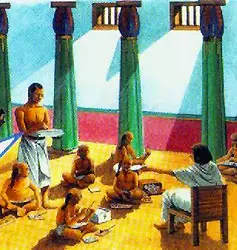Children in Ancient Egypt stayed with their mothers until the age of four. There were Egyptian Schools, but their access was not for all. Boys from wealthy families started school at the age of four. Father decided the occupation of a son before his first year at school. So the kids were taught only those subjects at school which were used in their career.

The schoolmaster had total control over the pupils. The students were expected to work as hard as they could and were often beaten on their backs with a rod for talking, being sleepy, slow or lazy. Girls were given education by their mothers, which was dictated by the tasks of their particular social standing.
They went to scribal school so maybe one distant day they could grow up and enter the royal service, maybe even a famous pharaoh or wealthy scribe. In scribal school, they still used the utensils of a scribe: a reed brush, ink made out of soot and water, and the world’s first paper papyrus.
Egyptian Students
Egyptian writing is called hieroglyphics. They spent hours copying hundreds of signs until they could make them well enough to please their teachers. This was hard work, and many students did not like the work they were given. Sometimes they were punished for skipping classes or not doing their work.The Prince’s School was the most respected of all of the Egyptian Schools and gave the very best Ancient Egyptian education. The Prince’s School would have educated the sons of the Pharaoh, members of the royal family, nobles and high officials.
The Prince’s School was the most respected of all of the schools and gave the very best Ancient Egyptian education. The Prince’s School would have educated the sons of the Pharaoh, members of the royal family, nobles and high officials.
Children in ancient Egypt imitated adult behavior. The children were learning their eventual trade or occupation by that very imitation. As they grew older, children took on more of the tasks on the farms, the workshops, the vineyards, and acquired practical skills and knowledge from their elders.
Egyptian Schools taught writing, reading, math, and sports as well as morals and manors. At the age of fourteen, sons of farmers or craftsmen joined their dads in their professions. Those children whose parents had higher status careers continued their education at special schools usually attached to temples or governmental centers.